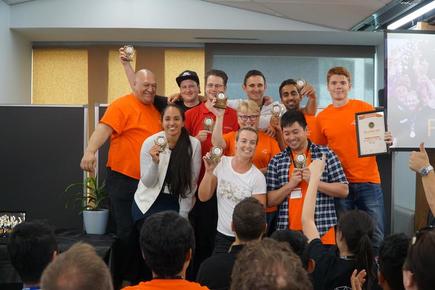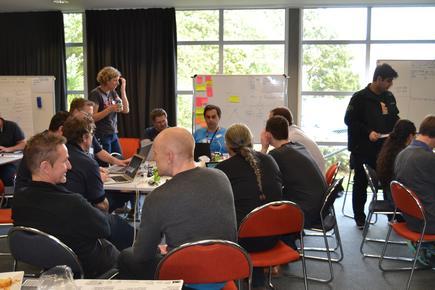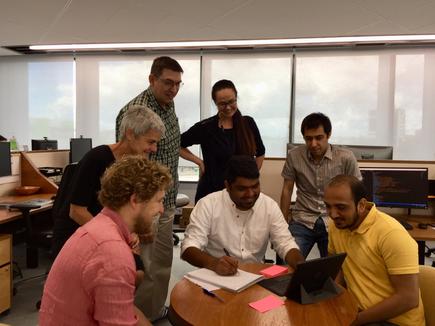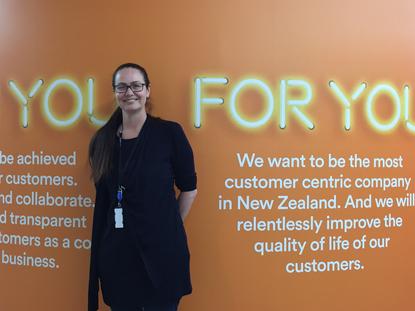Big data allows us to do ‘cool things’: Jennifer Cherrington-Mowat of Genesis Energy
- 12 December, 2017 07:05
One of the most important things is understanding the opportunity that data presents
When chief executive Marc England joined Genesis Energy in May, last year he had the vision for the company to be more than an energy supplier.
“He said we have a relationship with our customer where we supply their electricity and then once a month they pay their bills, and it could be so much more than that,” says Jennifer Cherrington-Mowat, executive general manager technology and digital at the power company.
“You know, as a result of supplying energy, whether it is gas, electricity or LPG, there is data,” says Cherrington-Mowat, who took on the newly created role, following roles in the UK for companies such as eBay UK, Amazon UK, Yahoo! Europe and, most recently, Electrocomponents PLC.
This data can help customers manage their accounts for their own comfort and convenience.
It’s the smarter use of data, she says, that is the foundation behind Energy IQ, the beta testing environment for the power company’s new products and services.
Energy IQ was launched to a group of around 25,000 customers in October.
The goal is to partner with customers to test and develop energy innovations and deliver products and services that give people more control and choices about their energy use.
Following the beta phase, the products will be launched more widely to customers, assuming they get the latter’s tick of approval during the beta testing.
In this way, Genesis is operating in the tech space by being agile and learning through testing and feedback with large numbers of people, or what she calls being in “a constant growth mode”.
The first product, Electricity Forecasting, combines the customer’s electricity usage data with advanced data modelling techniques to produce an accurate weekly (updated daily at 2am) forecast of energy demand unique to the customer.
“We are the only one doing this forecasting tool,” she claims, as other companies will offer data on past usage.
The service applies machine learning to improve the accuracy of the forecast and adapt over time to customers' electricity needs.
We are starting to see now what digital can do for industries... It is all customer focused and it is not all about systems
“This is today, we predict you will spend this, your average spend is likely to be this and likewise this will be how much during the week and you can look at this data and it is based on all of your past energy usage,” explains Cherrington-Mowat.
“Plus, information you told us, like you have five kids, you live in this kind of house and you have these many rooms.
“We put in a bit of weather data as well, and we can help predict going forward what your energy cost is going to be so you can then make some decisions about what you would like to do.
“It gives you the opportunity to say, 'What can I do differently?'”

She says in the two weeks following Energy IQ's soft launch, they received feedback from 600 people, who gave the app a four out of five rating.
She says Genesis customers who have a smart metre can already sign up for Energy IQ.
She says new services are being deployed in stages through to the new year. All these will be using advanced big data/machine learning and Internet of Things to give people more context to their energy use.
“They are all based around working with customers on the sort of things they will find useful.”
She says one product,for instance, will show the different types of energy use in the house, such as items that are always on, like the refrigerator and hot water usage.
“The more you tell us, the more granular we can give you. The detail might say, your heat pumps cost this. Your lighting costs this. You can make some choices about the time and the types of energy use you have.”
As to what next, she says it is getting out there using anonymised data.
“We can see collective behaviour of consumers and businesses and so we can start to give them more information, if they feed us back information as well.”
The more information we have, the more we can tell people how they are using their energy, how they might save money and have different ways of managing their energy budget, she states.
“It is not for everybody, but for families who are interested in managing a budget, who are thinking what [appliances] they are going to turn on, or about more energy efficient products, that is important stuff.
“They will be able to see the difference.
“One of the most important things is understanding the opportunity that data presents,” she says.
She then takes an example from an adjacent and much disrupted industry, retail.
“I might walk to a store and if I am lucky, somebody will smile at me, and then I will visit a number of areas,” she says.
She points out chances are nobody will be speaking to her as she does this. “Perhaps I will buy something or perhaps I will leave and the store will know nothing about my visit.”
Whereas, she says, when she will go to an online store like Amazon, it will welcome her and remind her the last time the store had delivered the following stuff for her.
It will also tell her about things she may be interested in based on her past purchases and browsing history.
“All they are doing is using data,” she says. “And I feel I have a relationship with them because they are personalising things for me.
“Likewise, the more [data] customers choose to share with us, the more we can do for them.”
“We have got all of this data and [are] now turning it into stuff relevant to people,” she says.
“I think that is the same across any industry,” she says, “so getting people who understand the value of data, who think about how to combine bits of data and what is the outcome of doing all of these things together [is important].”
She says what worked for Genesis was the way the teams have worked together.
We said, ‘what things are important to customers?’
The company started what she calls an “incubation team”.
“They spend quite a lot of time talking to customers,” she says. “If you could understand more about your energy use, what would be useful, why would it be useful?’
She says the incubation unit has a classic agile setup.
"We have a product owner, a scrum master, some developers, customer services people and marketing,” she says. Some data people from her team are part of the unit.

Get people who understand the value of data, who think about how to combine bits of data and what is the outcome of doing all of these things together
They work on the same floor with the team that runs My Account platform that allows users to manage their account online.
There is constant back and forth exchange of ideas between the teams.
“If I do this, how will that affect the user interface, that kind of thing? They all work together and they are all excited...Because this is quite cool for the energy industry.”
“We are on the cusp of a digital evolution,” she says.
“We are starting to see now what digital can do for some of these industries...It is all customer focused and it is not all about systems.”
She says this was what happened during the two hackathons they held this year.
A third one is scheduled for early 2018, with customers as major participants.
The first one, held in March, focused on reimagining the customer experience through the use of mobile and/or digital technologies.
It resulted in the creation of a Hololens and Augmented Reality experience that showed real-time power usage. The winning team also pitched a chatbot to help customer queries. It is now live on the Genesis website, with six other ideas pitched during the hackathon also in development.

The second hackathon focused on big data, ML and IOT; combining the skills of data scientists with energy generation engineers.
Three projects have been invested in, with the winning project featuring a mobile app that allows access to information held about an asset, while in the field.

“These projects are all around data, and how they can help the generation plant more effectively and efficiently, and keep people safe as well,” she says.
“It is now a case of we have got lots of choices [on projects], what are the ones that we can follow up on?”
“There will be lots of great stuff coming up,” she says, smiling.
“You expect that in this day and age.”
Because, if you are not going to move, “you become irrelevant.”

Send news tips and comments to divina_paredes@idg.co.nz
Follow Divina Paredes on Twitter: @divinap
Follow CIO New Zealand on Twitter:@cio_nz
Sign up for CIO newsletters for regular updates on CIO news, views and events.


